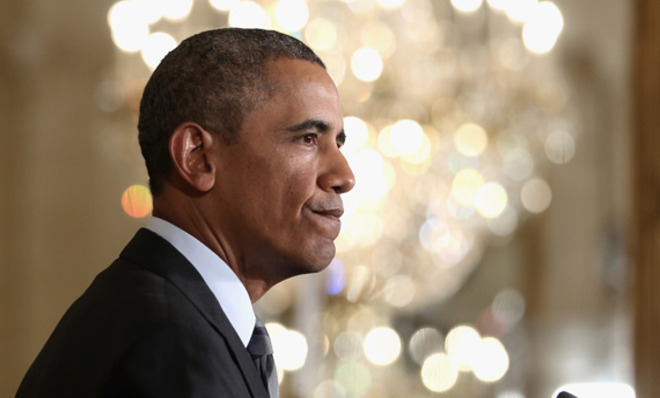Obama's State of the Union strategy: Don't blame me — blame Congress!
So much for trying to change Washington


A free daily email with the biggest news stories of the day – and the best features from TheWeek.com
You are now subscribed
Your newsletter sign-up was successful
Despite a litany of lofty liberal promises in his second inaugural address last year, President Obama has so far failed to accomplish much of that ambitious second-term agenda.
And now, realizing that the clock on Obama's presidency is ticking, and that the only way to address many of the president's goals may be with end runs around Congress, the White House has signaled in recent weeks that the president will take more unilateral actions in the future. During his State of the Union Tuesday night, expect Obama to make a case for doing exactly that.
Obama "will seek out as many opportunities as possible to work with Congress in a bipartisan way," writes Dan Pfeiffer, a senior White House adviser, in previewing the speech. However, "when American jobs and livelihoods depend on getting something done, he will not wait for Congress." Pfeiffer adds that Obama has "a pen and he has a phone" — shorthand for executive orders and presidential muscle — that he will wield to get things done.
The Week
Escape your echo chamber. Get the facts behind the news, plus analysis from multiple perspectives.

Sign up for The Week's Free Newsletters
From our morning news briefing to a weekly Good News Newsletter, get the best of The Week delivered directly to your inbox.
From our morning news briefing to a weekly Good News Newsletter, get the best of The Week delivered directly to your inbox.
In other words: Obama is ready to blame the legislature and go it alone.
We've seen inklings of this tactical shift coming for some time now.
Last year, Congress scuttled immensely popular gun control legislation, and House Republicans, in a quixotic bid to destroy ObamaCare, shut down the federal government for two weeks and threatened to default on the national debt. All told, it was the least productive Congress in at least four decades, or as far back as there is reliable, comparable data. And as 2013 wore on, Obama appeared more and more exasperated with how Congress was hindering his efforts.
"It turns out Marlon Brando had it easy," Obama told The New Yorker's David Remnick, in a sprawling profile published last week, "because, when it comes to Congress, there is no such thing as an offer they can't refuse."
A free daily email with the biggest news stories of the day – and the best features from TheWeek.com
An increased reliance on executive orders would allow Obama to at least chip away at more of his policy goals over the remainder of his term. It might be a smart political move, too.
Obama's approval rating remains underwater, but is improving. A Washington Post-ABC News survey finds his approval at 46 percent, up from a low of 42 percent back in November. Congress' job approval? A measly 13 percent.
Congress is an easy — and, given its feet-dragging of late, sometimes legitimate — scapegoat. So though Obama may not be Mr. Popular himself, the contrast with Congress is probably a favorable one for him among many voters. If executed skillfully, he should be able to make a strong case to the public that the much-loathed legislature has given him no choice but to take action on his own.
It's a far cry from Obama's old vow to "change" the culture of Washington. But the president has already walked away from that rosy goal, saying back in 2012 that he'd learned, "You can't change Washington from the inside."
Republicans are, understandably, already crying foul.
"It sounds vaguely like a threat," says Sen. Rand Paul (R-Ky.), who will give his own rebuttal — not the official GOP one — to Obama's address.
Still, Republicans have undeniably made a habit of opposing out of hand just about anything the president does, and they've assailed him many times in the past for, they claim, refusing to work with them. That critique didn't stick even amid the government shutdown — when Obama and Democrats did indeed refuse to negotiate — so there's little reason to believe it will stick now.
Jon Terbush is an associate editor at TheWeek.com covering politics, sports, and other things he finds interesting. He has previously written for Talking Points Memo, Raw Story, and Business Insider.
